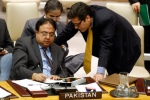As a memorandum by the Secretary-General of the United Nations (SG) notes, the terms of five current judges of the International Court of Justice (ICJ) will come to an end on 5 February 2015 (Judges Sepulveda, Keith, Bennouna, Skotnikov, and Donoghue). An election to fill these five vacancies is scheduled for the morning of Thursday, 6 November. The details of the voting procedure to be followed in the General Assembly and the Security Council are described in the SG’s memo.
Following the procedure laid down in Articles 4-7 of the ICJ Statute, nine candidates have been nominated by the national groups of the Permanent Court of Arbitration (PCA) to fill the five vacancies. The nine candidates are: Jemal Agatt (Mauritania); Eugenie Liliane Arivony (Madagascar); Mohamed Bennouna (Morocco); Sayeman Bula-Bula (Democratic Republic of the Congo); Susana Ruiz Cerutti (Argentina); James Richard Crawford (Australia); Joan E. Donoghue (USA); Kirill Gevorgian (Russia); and Patrick Lipton Robinson (Jamaica). Of these, Mohamed Bennouna and Joan Donoghue are members of the Court already and are seeking to be reelected for a second term. The list of candidates prepared and circulated by the SG also indicates the nominations received by each candidate. James Crawford leads the list of nominations, having been nominated by the PCA national groups of 27 States, followed by Joan Donoghue (22 nominations), Kirill Gevorgian (13 nominations), Mohamed Bennouna and Susana Ruiz Cerutti (11 nominations each), Patrick Lipton Robinson (seven nominations), Jemal Agatt, Eugenie Liliane Arivony, and Sayeman Bula-Bula (one nomination each). Of course, these nominations are not determinative of the results, which are influenced by a number of other professional and geopolitical factors, such as the regional representation on the bench, “P5” candidates, etc. In addition to the list of candidates and the nominations received by them, a document containing the curricula vitae of the candidates has also been circulated by the SG.
From a South Asian perspective, it is interesting to see that hardly any national groups from the region have nominated any candidate. A quick survey reveals that the national groups of only four Asian States have engaged in the process: Viet Nam, Thailand (both nominating James Crawford), China, and the Republic of Korea (both nominating Joan Donoghue and Kirill Gevorgian). India’s case is rather disheartening as it does not even appear to have a national group anymore, with the mandate of all of the PCA members it nominated having expired.








